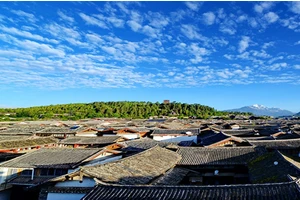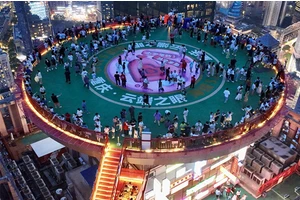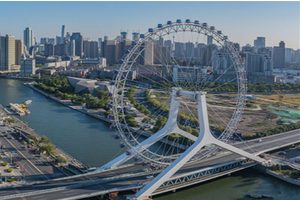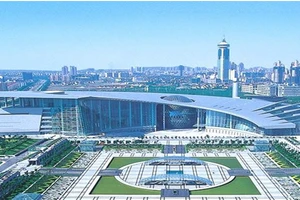Guangxi cenxi travel
Shuangshifeng
Shuangshifeng is located 1 km northwest of Guanyin lotus in Taiping Shishan. The two stones are towering over the wall, so they are called double stone peaks. The two peaks are high in the east and low in the west, and the low peak is about three-fifths of the peak. Seen from the north, the peak is like a horse's head, the low peak is like a saddle, and it is like a galloping horse, so it is also called Tianma Stone. There are two other stones standing in the southwest of the low peak, more than 30 meters high. The bottom of a stone seam in the middle is 70 cm wide and the top is about 2 meters wide. There is a stone hanging horizontally in the middle, which is shaped like a portal, so it is called a first-line Tianmen.
Shimiaoshan
Shimiao Mountain is located in the southwest of Shuiwen Town, with a relative height of 950 meters and an area of more than 170 mu.
The stone temple is surrounded by mountains, rolling and rising, leading directly to the clouds. A stream surrounds the foot of the mountain from left to right, connects with the Huanghua River, and becomes an organic whole, just like a jade belt around the stone temple. A highway spirals up the mountain of Shimiao and goes straight to the top of Shimiao. On the Stone Temple Mountain, there are grotesque rocks, towering peaks and various shapes, and flowers and trees grow in the crevices, flourishing, every morning and evening, in detail.
Tianlongding National Mountain Park
Tianlongding National Mountain Park covers an area of 15 square kilometers. Tianlongding, the main peak of the scenic spot, is 1221 meters above sea level and 221 meters in relative height, belonging to the main peak of Yunkai Mountain Range. There are four peaks above 1000 meters above sea level in the scenic area, such as Shibaoding, in-laws Dingding and Huguangding.
The natural resources of Tianlongding Scenic Area are diverse. There are alpine lakes, virgin forests, ravines and canyons, valleys and waterfalls, alpine meadows above 1000 meters above sea level, and the altitude is detailed.
Dazhu Longmu Temple
Dazhu Longmu Temple is located in Dazhu Village, Nuodong Town, Cenxi City. It is 60 kilometers away from Wuzhou city and 20 kilometers away from Cenxi city.
Dragon Mother is a native of tengxian, Wuzhou. There is also a record in tengxian County Records that Dragon Mother was born in Jinzhu Village, the 21st capital of tengxian. Due to several changes in administrative divisions in past dynasties, Jinzhu Village of the 21st capital was later merged with Dahua Village and renamed Dazhu Village. Therefore, another theory holds that the Dragon Mother was born in Dazhu Village, Nuodong Town, Cenxi City.
Baishuangjian
Baishuangjian is located in Ji Tai Village, Nandu Town, Cenxi City. It is 120 kilometers away from Wuzhou city and about 40 kilometers away from Cenxi city center. It is a natural ecological scenic spot integrating mountains, water, forests, ponds, valleys, strange rocks and sacred beaches.
Deng Qing Temple
Deng Qing Temple is located in Nandu Street, Nandu Town, Cenxi City. It is 100 kilometers away from Wuzhou city and 20 kilometers away from Cenxi city. It is a tourist attraction to show China's ancient architectural art and local folk culture.
Deng Qing Temple is a hard-topped brick-wood structure, which consists of a front hall, a back hall and a central corridor, with blue bricks as walls, a beam frame as a bucket-piercing framework, and beams, columns, Fang and Tan all made of lattice wood. The eaves of the front and rear halls are sealed with carved boards, red columns stand upright, painted colored beams, wishful bucket arches, and the corridors connecting the front and rear halls on the street are covered with coupons, and the details are left and right.
Cenxi Guandi Temple
Guandi Temple is located on the Huanghua River in Nandu Town, Cenxi City, adjacent to the famous ancient temple Deng Qing Temple. The temple was built in the 9th year of Qing Daoguang (1829). It is a brick and wood structure with a front hall, a back hall, left and right wings and a patio. The front hall is covered with yellow glazed tiles, and the top of the ridge is decorated with Shuanglong playing beads, which makes the hall magnificent. There are more than ten painted murals on the interior and exterior walls, with bright colors, smooth lines and exquisite painters. A stone carving horizontal plaque is embedded in the front of the temple gate, and the three large raised characters of "Guandi Temple" at the mouth of the bowl are bold and eye-catching, with great details.
The postcode of Cenxi City, Wuzhou City, Guangxi Zhuang Autonomous Region is 543200.
Cenxi City, located in the east of Guangxi Zhuang Autonomous Region, China, is a county-level city hosted by Wuzhou City, located at the junction of eastern Guangxi and western Guangdong, and is the east gate of Wuzhou City. This city has a long history and profound cultural heritage. It has the reputation of "the hometown of longevity in China" and is known as the "Jade of the South".
Cenxi has a superior geographical environment, which belongs to subtropical monsoon climate, with four distinct seasons and abundant rainfall. The territory is beautiful and rich in natural resources, with national AAAA scenic spots such as Longmu Lake and Tianlongding National Forest Park, which is a good place for outdoor sports and eco-tourism.
Agriculture is the economic pillar of Cenxi, with rice, fruit, tea, bamboo and so on as the main products, among which, Cenxi Shatangju, black-skinned wax gourd and other special agricultural products are famous far and wide. In addition, the ceramic industry is also a highlight of Cenxi, enjoying the title of "Porcelain Capital of South China", where the ceramic technology is unique and the products sell well at home and abroad.
In terms of history and culture, Cenxi is rich in cultural heritage, such as Baishi Ancient Village and Longmu Temple, bearing a strong Lingnan cultural atmosphere. At the same time, Cenxi is also an important settlement of Zhuang nationality in Guangxi, where Zhuang culture is fully displayed. The annual March 3 Song Fair Festival is very lively and attracts many tourists.
Generally speaking, Cenxi City is a this beautiful city with natural scenery, human history and economic development, which has high tourism development value and quality of life.






